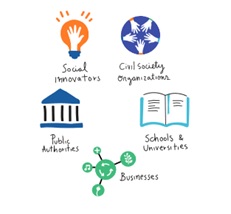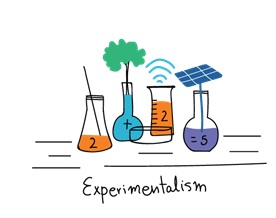City and Citizen science as enablers for Co-City
Edited on
19 September 2022In the co-governance model, city officials are facilitating urban initiatives, re-centering citizens at the heart. How does this shift from government to governance make scientific institution a key actor, challenging the relation between science, city, and citizens ?

As Sheila Foster and Christian Iaione analyzed it in the upcoming Co-Cities book, scientific institutions play the key role of connecting actors and safeguarding community interest in each local context. To reach collaboratives cities, City Science Offices (CSO), as promoted by the City Science Initiative within the Joint Research Center - European commission, connect research & innovation and policy making. To put science and research at the service of urban challenges, CSO develop "evidence-informed policy-making at cities' level”, in conducting ground-based experimentations and empowering communities. As part of the City’s administrative structure, CSO foster the design of policies that are future proof and enable action by city residents toward a climate neutral and socially just city.
Furthermore, the City Science Initiative aims to build an European networks of CSO to share knowledge and experiences about social and urban innovation.
A preliminary result of the collaboration among the City Science Initiative network has been published in the research platform of the city of Amsterdam <openresearch.amsterdam> with the LabGov.City contribution, highlighting how the science-policy interface operates locally and at the European level in light of the emergent urban challenges and crises.

| https://ec.europa.eu/jrc/ |
Thus, in developing a CSO jointly with Luiss University, the city of Reggio Emilia aims at relate with innovative urban networks at the local, national, and international scale. Three PhD students are now working in and for the city to support its institutional change, strengthening democracy in a scenery of ecological and digital transition.
a) Knowledge institutions are hubs for collaboration
Knowledge institutions as universities play a key role because they lead initiatives as getting funds, enabling education, and help to develop citizen science in opening researches, and processing data provided by citizens. For example, the Cluj-Napoca's CSO engages and empowers its citizens in accompanying them in the digital and ecological transition, and in the testing and implementation of innovative solutions.
Knowledge institutions also act as a safeguard for community interests during the policy making, and for the equal share of benefits within the community itself. Finally, they can compensate for a weak public state.
Quintuple helix in the Co-City Protocol

| http://labgov.city/ |
b) CSOs enable communities in Co-Governance processes
CSO provide information, enable mobilization, and connect communities and the private sector. In working as a collaborative hub, these places create the conditions for a strong collaborative governance involving all the actors from the quintuple helix model: public - private - science - social - community partnership.
Amsterdam, Hamburg, Paris, Reggio Emilia, Thessaloniki, are examples of European cities that have developed such a multi-stakeholder principle through CSO.
CSO are essential in collaborative cities as they create an inclusive multi-stakeholder dialogue and thus enable to develop the quintuple helix model.
c) CSOs enable to implement urban experimentalism

| http://labgov.city/ |
In re-centering communities, CSO are key nodes to support the creation of processes that suit the best to local reality through ground based experimentations. In fact, urban space has to be understood as a social fabric which requires evolution, experimentation, empiricism, and interactivity. Place-based spaces for experimentation as living labs, new city agencies, or collaboratories, would develop interactions and so adaptation to local contexts. This essential feature of experimentalism is among the five design principles proposed by the Co-City approach.
Thereby, Bologna enhance neighborhood labs and experimentation techniques to implement innovations through a citywide laboratory. The city created different platform as Incredibol (2011), Comunità Iberbole Platform (2014), and policy Pilastro (2016). These experimentations, led by the new "Foundation for Urban Innovation" which works as a living lab, enable to develop initiatives as the Co-Bologna and the participatory budget.

Scientific institution take an active role in building innovative cities. CSO question the relation between research and execution, theory and practice, as well as the role of science in cities. As Sheila Foster and Christian Iaione explain it in the upcoming Co-Cities book, cities and science can together enable cooperation with citizens for more sustainable and fairer environment.
City and citizen science pave the way to collaborative cities which invest both time and resources on collaboration. Public authority supports the development of CSO, which open science to citizens, enable evidence-informed policies at a local scale, and build bridges between actors to reach a participatory and collective governance.
Author of the article Christian Iaione, Ad hoc expert
 Submitted by Laura Socci on
Submitted by Laura Socci on
